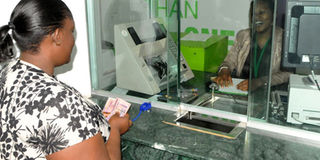Islamic banking gets nod from President Museveni

A customer counts money after a transaction at a bank in Kampala. FILE PHOTO
What you need to know:
Method. The Islamic banking model uses methods of profit/loss sharing to facilitate financial transactions.
President Museveni wants negotiations on Islamic banking to take place in the next one month. The move is likely to pave way for the introduction of the Islamic banking model, also known as halala banking—where instead of a bank imposing interest, it shares the profit it accrues with the clients.
The President was speaking during an Iftar (breaking fast dinner) he hosted for Muslim Community together with his Wife, Janet Museveni on Monday.
President Museveni, who also said he would love to borrow from a bank that uses the Islamic banking model, directed his staff to conclude the discussions on the matter by close of September so that its implementation can begin thereafter.
He said: “My staff will take this up, and I will discuss it with the Ministry of Finance and the Muslim scholars so that I understand how it works because I keep hearing this (Islamic banking) time and again.”
The President was responding to Mufti Shaban Mubajje who said the Muslim community cannot use the services of the local financial institutions because it’s based on the Western financial model that is not consistent with the Holy Quran and the teaching of Prophet Mohammad.
“The current system of banking (based on interests) was introduced by Western intellectuals, because even among the Banyankole if you are given a cow, you return an equivalent—in other words a cow for a cow,” said the President.
Islamic banking is a system that is based on the principles of Islamic law (also known Shariah) and guided by Islamic economics. Two basic principles behind Islamic banking are the sharing of profit and loss and, significantly, the prohibition of the collection and payment of interest.
Collecting interest is not permitted under Islamic law—yet it is what drives the Western based model used by local banks, something Mufti Mubajje says explains why a cross section of Muslims could are wallowing in poverty.
Where it has worked
Kenya and Rwanda are already using the model, and if the President’s directive is heeded, it will not be long before other local banks embrace the system. Banks like KCB-Uganda and Tropical banks just can’t wait for legislations allowing this kind of model. Formed in 1975, the Dubai Islamic Bank has the distinction of being the world’s first full-fledged Islamic bank.




